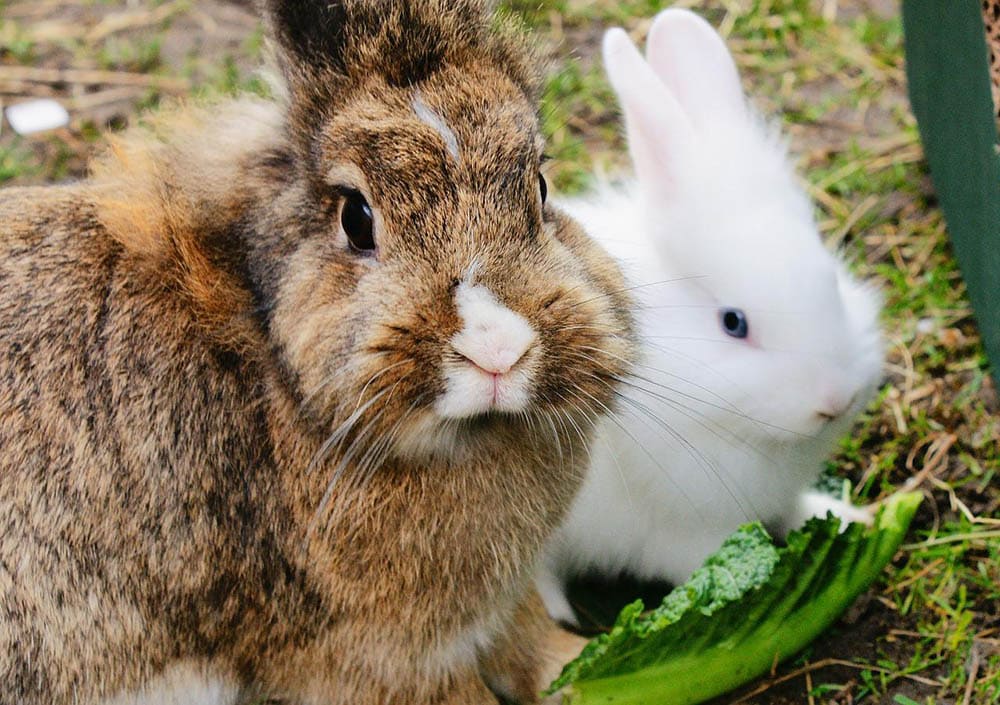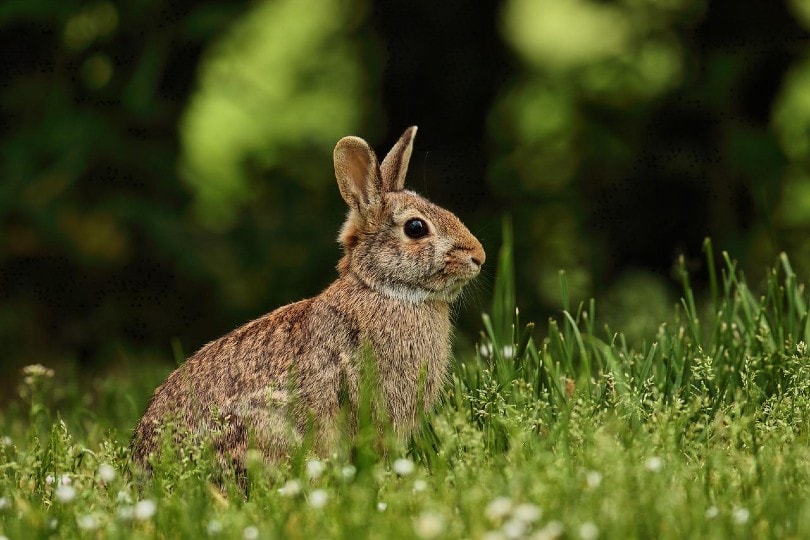How to Stop Rabbits From Eating Plants: 7 Tips & Tricks
-
Ashley Bates
- Last updated:

If you have flower gardens or vegetable gardens, you’ve likely had to deal with a bunch of critters and insects munching on your goodies. If you have an adorable Peter rabbit visiting your property, you can probably sympathize a lot with Mr. McGregor right now.
Luckily, you don’t have to worry about doing anything inhumane to these creatures, as they only do what’s natural. However, you can prevent, deter, and discourage rabbits from eating your plants. Let’s take a look at how to do this, along with gathering other important information.
The 7 Tips & Tricks to Stop Rabbits Eating Plants
1. Ensure the Culprit Is a Rabbit

Before you assume that the rabbits are the reason your carrot tops are low, you might want to ensure that’s actually what you’re dealing with first. Wild rabbits will come to eat garden vegetables, but they might not be the only herbivore lurking around your plants.
Once you’re confident it’s a rabbit, you can use various methods to keep them away. Luckily, rabbits only have a certain height they can reach, making it better for some taller plants, as the damage is more minor. However, if the damage seems to be higher up on your plant, this could be something bigger, like a deer.
2. Get the Proper Fencing
| Cost: | $25+ |
Installing a fence is one of the most popular methods to keep any animal away from your vegetables. Ideas can vary depending on your setup and budget. If you think of a fence, it doesn’t have to break the bank.
You don’t have to put up the most expensive and the niftiest version. Rabbits, thankfully, have a limited range of motion, meaning the fence itself doesn’t have to be very tall to deter these predators.
Many gardeners use chicken wire to keep bunnies and other herbivores out. But you can use super inexpensive fencing or plastic netting to keep rabbits at bay.
3. Spread Fake Urine
| Cost: | $10+ |
Rabbits are prey animals that have a large number of predators after them. If you buy urine from a store that is of a fox, coyote, or another predator, it can discourage rabbits from entering your garden.
Don’t worry, you don’t have to rush out to capture wild animal urine. This isn’t a foolproof plan, as some rabbits don’t seem to be completely deterred. But it does lessen the likelihood that something so prone to prey upon would come around, knowing the risks. There are plenty of options, both in-store and online, for you to choose from.
4. Spread Species-Specific Repellent

| Cost: | $5+ |
You can easily buy a premade repellent geared to deter rabbits and other potential pests—like deer. These sprays contain the right amount of specific ingredients—like certain chemicals and herbs, such as thyme and garlic.
You can even whip up a DIY concoction at your house. There are plenty of options to toss together ingredients in your own cabinet.
- Allium
- Vinegar
- Chili powder
- Sulfur
- Lavender
- Begonias
- Geraniums
- Blood meal
Whatever mix you decide on, make sure it is safe to use on plants.
5. Plant Allium Family Around the Perimeter
| Cost: | $10+ |
Rabbits really don’t like certain kinds of plants. If you want to deter rabbits from entering your garden space, you can always plant allium family plants.
Plants in this category are generally onions, chives, and garlic. These plants are undesirable to rabbits, as they are totally toxic and even life-threatening once consumed. If you have a perimeter around the plants that you want to protect, they are much less likely to try to eat them.
This might not be a foolproof plan. Rabbits are highly mobile creatures that will jump or hop through anything they can. So even though the onions might deter them, they still know your vegetables are readily available on the other side.
For an added layer of protection, it’s best to put up some other type of deterrent alongside your newest onion patch.
6. Have a Dog Around
| Cost: | Free |
Have a guard dog for your garden? Have you ever even heard of such a thing? Actually, having your dog out in the yard distributes their scent around your property. If rabbits smell that a dog could be lurking around, it can seriously deter it, and other animals, from coming about.
This is a cheap and ingenious idea to prevent your rabbits from coming around when your dog isn’t physically present. Some people even collect the pet’s hair in clumps. Once they have enough, they disperse it around the garden’s perimeter.
Some rabbits will smell the hair and not take any further risks.
7. Set Live Traps
| Cost: | Free—$25+ |
If you plan to relocate the rabbit, you can set live traps to get control over the situation. Put a few easily accessible items into the live trap and wait. If you were a sneaky little bandit who comes to snack at a certain point in the day, you might come back to find that they have been captured.
This is a highly humane way to ensure the livelihood of the creature while saving the plants you work so hard to grow. The animal is entirely unharmed and can go on living life in a more suitable habitat—away from your home.
Live traps are readily available online and in certain types of stores. Keep in mind that if you have any other friends or family members who have rural homes, they might have a live trap on hand that you could borrow.
Extra Tips to Consider
Rabbits are docile creatures that are quiet and adorable. It can be hard to imagine when you look at their sweet faces that they can cause so much destruction to your plants. You can’t really blame them. They found an abundance of easily accessible food for nourishment. Naturally, a rabbit would want to come to enjoy the goodies growing.
However, if you were a gardener, you know just how frustrating this can be. Between insects and herbivores, it can be tough to help your plants thrive and reap a high yield from fruit-bearing plants. Even though it might be tempting to eliminate the problem through execution, this really isn’t the best way to go about it.
You can think about relocating the rabbit if you can’t seem to deter them from getting into your garden, even after you put up reinforcements. However, most of the time, rabbits will not be that troublesome to deal with.
In Conclusion
If you have a pesky problem, and a fluffy carrot lover is the reason, you can easily take control of the situation. As long as they don’t have direct access to your plant life, they can’t do any damage.
Keeping some type of perimeter around your garden and various other tactics can deter the rabbit from coming completely.
Featured Image Credit: kaz turner, Pixabay
Contents

